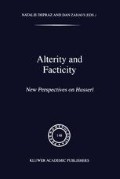Abstract
Manfred Frank has in recent publications criticized a number of prevailing views concerning the nature of self-awareness,1 and it is the so-called reflection theory of self-awareness which has been particularly under fire. That is, the theory which claims that self-awareness only comes about when consciousness directs its ‘gaze’ at itself, thereby taking itself as its own object. But in his elaboration of a position originally developed by Dieter Henrich (and, to a lesser extent, by Cramer and Pothast) Frank has also more generally criticized every attempt to conceive original self-awareness as a relation, be it a relation between two acts or a relation between the act and itself.2 Every relation entails a distinction between two (or more) relata and, according to Frank, it would be impossible to account for the immediacy and infallibility of self-awareness (particularly its so-called immunity to the error of misidentification), if it were in any way a mediated process. Thus, self-awareness cannot come about as the result of a self-identification, a reflection, an inner vision or introspection, nor should it be conceived as a type of intentionality or as a conceptually mediated propositional attitude, all of which entails the distinction between two or more relata. The pre-reflective self-awareness of an experience is not mediated by foreign elements such as concepts and classificatory criteria, nor by any internal difference or distance. It is an immediate and direct self-acquaintance which is characterized by being completely and absolutely irrelational (and consequently best described as a purely immanent self-presence).3
Access this chapter
Tax calculation will be finalised at checkout
Purchases are for personal use only
Preview
Unable to display preview. Download preview PDF.
Literature
Benoist, J.: Autour de Husserl. Vrin, Paris 1994.
Bernet, R.: “Die ungegenwärtige Gegenwart. Anwesenheit und Abwesenheit in Husserls Analyse des Zeitbewußtseins,” Phänomenologische Forschungen 14, 1983, pp. 16–57.
Bernet, R.: La vie du sujet. Épiméthée PUF, Paris 1994.
Brand, G.: Welt, Ich und Zeit. Martinus Nijhoff, Den Haag 1955.
Brough, J.B.: “The Emergence of an Absolute Consciousness in Husserl’s Early Writings on Time-Consciousness,” Man and World 5, 1972, pp. 298–326.
Claesges, U.: Edmund Husserls Theorie der Raumkonstitution. Martinus Nijhoff, Den Haag 1964.
Cramer, K.: “Erlebnis’. Thesen zu Hegels Theorie des Selbstbewußtseins mit Rücksicht auf die Aporien eines Grundbegriffs nachhegelscher Philosophie,” in H.-G. Gadamer (ed.): Stuttgarter Hegel-Tage 1970, pp.537–603, Bonn 1974.
Derrida, J.: La voix et le phénomène. Épiméthée PUF, Paris 1967.
Frank, M.: Was ist Neostrukturalismus ? Suhrkamp, Frankfurt am Main 1984.
Frank, M.: Die Unhintergehbarkeit von Individualität. Suhrkamp, Frankfurt am Main 1986.
Frank, M.: Das Sagbare und das Unsagbare. Suhrkamp, Frankfurt am Main 1989.
Frank, M.: Zeitbewuβtsein. Pfullingen 1990.
Frank, M.: Selbstbewuβtsein und Selbsterkenntnis. Reclam, Stuttgart 1991a.
Frank, M. (ed.): Selbstbewuβtseinstheorien von Fichte bis Sartre. Suhrkamp, Frankfurt am Main 1991b.
Frank, M. (ed.): Analytische Theorien des Selbstbewuβtseins. Suhrkamp, Frankfurt am Main 1994.
Hart, J.G.: The Person and the Common Life. Kluwer, Dordrecht 1992.
Hart, J.G.: “Constitution and Reference in Husserl’s Phenomenology of Phenomenology,” Husserl Studies 6, 1989, pp. 43–72.
Heidegger, M.: Sein und Zeit. Max Niemeyer, Tübingen 1986.
Held, K.: Lebendige Gegenwart. Martinus Nijhoff, Den Haag 1966.
Held, K.: “Phänomenologie der Zeit nach Husserl,” Perspektiven der Philosophie 7, 1981, pp. 185–221.
Henrich, D.: Fichtes ursprüngliche Einsicht. In Festschrift für Wolfgang Cramer, pp. 188–232. Frankfurt am Main 1966.
Henrich, D.: “Selbstbewußtsein, kritische Einleitung in eine Theorie.” In Bubner, Cramer, Wiehl (Eds.): Hermeneutik und Dialektik, pp. 257–284. Tübingen 1970.
Henry, M.: L’essence de la manifestation. Épiméthée PUF, Paris 1963.
Henry, M.: Phénoménologie matérielle. Épiméthée PUF, Paris 1990.
Holenstein, E.: “Passive Genesis: Eine begriffsanalytische Studie.” Tijd-schrift voor Filosofie 33, 1971, pp. 112–153.
Landgrebe, L.: Der Weg der Phänomenologie. Gerd Mohn, Gütersloh 1963.
Landgrebe, L.: “Reflexionen zu Husserls Konstitutionstheorie.” Tijdschrift voor Filosofie 36, 1974, pp. 466–482.
Landgrebe, L.: Faktizität und individuation. Felix Meiner, Hamburg 1982.
Pothast, U.: Über einige Fragen der Selbstbeziehung. Vittorio Klostermann, Frankfurt am Main 1971.
Ricoeur, P.: Soi-même comme un autre. Éditions du Seuil, Paris 1990.
Sartre, J.-P.: L’être et le néant. Gallimard, 1943.
Sartre, J.-P.: “Conscience de soi et connaissance de soi.” Bulletin soc. Franç. de philosophie XLII, 1948, pp. 49–91.
Seebohm, T.: Die Bedingungen der Möglichkeit der Tranzendental-Philosophie. Bouvier, Bonn 1962.
Straus, E.: Vom Sinn der Sinne. Springer-Verlag, Berlin 1956.
Zahavi, D.: Husserl und die transzendentale Intersubjektivität. Eine Antwort auf die sprachpragmatische Kritik. Kluwer, Dordrecht 1996.
Editor information
Editors and Affiliations
Rights and permissions
Copyright information
© 1998 Springer Science+Business Media Dordrecht
About this chapter
Cite this chapter
Zahavi, D. (1998). Self-Awareness and Affection. In: Depraz, N., Zahavi, D. (eds) Alterity and Facticity. Phaenomenologica, vol 148. Springer, Dordrecht. https://doi.org/10.1007/978-94-011-5064-4_9
Download citation
DOI: https://doi.org/10.1007/978-94-011-5064-4_9
Publisher Name: Springer, Dordrecht
Print ISBN: 978-94-010-6126-1
Online ISBN: 978-94-011-5064-4
eBook Packages: Springer Book Archive

